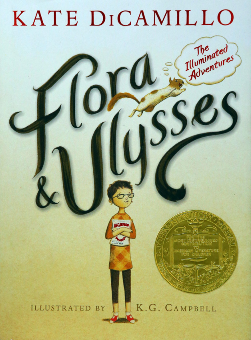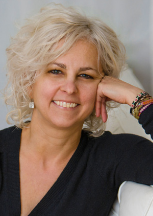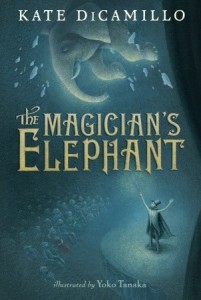Editor’s Note: We’re delighted to reprint Kate DiCamillo’s Newbery Medal acceptance speech for Flora & Ulysses, in our Memoir Notebook column—a speech that, through poignant and surprising turns, captures our ways of looking at and being in the world.
Kate DiCamillo’s Newbery Medal Acceptance Speech
I learned the word capacious from a William Maxwell short story titled “The Thistles in Sweden.”
The word appears at the very end of the story, in the last line, which goes like this: “…and I think that if it is true that we are all in the hand of God, what a capacious hand it must be.”
“The Thistles in Sweden” is the story of an apartment on Murray Hill, of the furniture and the china and the wallpaper and the curtains and the skylight in the apartment, and of the cat and the husband and the wife who live there, and how they are awaiting, together, the arrival of a child.

Kate DiCamillo received the 2014 (John) Newbery Medal for Flora & Ulysses: The Illuminated Adventures (Candlewick). Her acceptance remarks were delivered at the Newbery Caldecott Banquet on Sunday, June 29, 2014, during the American Library Association Annual Conference.
I have read the story at least a dozen times now, and each time I get to that last line, I can feel myself lifted up with surprise and gratitude and joy.
That is to say that I am made capacious—my heart is made capacious—by the story. It pleases me that I learned the word from the story and that the word also describes how the story makes me feel: open, more capable of seeing and receiving the wonders of this world.
I have carried the word capacious around with me like a pebble in my pocket ever since I read the story for the first time eight years ago.
I have taken the word out and held it up to the light and admired it, and then I have put it away again.
I have been saving the word for something. I didn’t know what.
In January of 2009, on a bitterly cold day in Minneapolis, my eighty-six-year-old mother and I were walking into a building that overlooks the Mississippi River. Just as my mother stepped over the threshold, she tripped and fell and landed in such a way that she was half inside and half outside. When I asked her to take my hand, she said she couldn’t.
I said, “What do you mean? Here, just give me your hand and I will help you.” And she said, “I don’t think so. I don’t think I can do it.”
My mother was a champ, a fighter. She was (to use the words she so often used to describe me) “a piece of work.” And so it terrified me when she said, “I don’t think so. I don’t think I can do it.”
Two very large men were standing outside, at the entrance to the building, and one of the men said, “It’s too cold. It’s too cold for her to be outside. She has to go inside.”
This man then took off his mittens and handed them to me and said, “Here, hold these.”
And he bent down and picked my mother up.
He cradled her in his arms as if she were a small child. He carried her inside.
And what did I do while this man carried my mother away?
I stood there and stared at his mittens.
The mittens were made of leather and lined with some kind of fleece and they were the largest mittens I have ever seen in my life. They were enormous. They looked as if they belonged to a giant.
I was mesmerized by the sheer size of them, their capaciousness.
And so when, finally, I turned and followed the man and my mother inside, what was going through my head was that line from the William Maxwell story, “I think that if it is true that we are all in the hand of God, what a capacious hand it must be.”
My mother was now in the capacious hands of a stranger who carried her into a coffee shop and put her on a chair. “Does it hurt?” the man said to my mother.
And she said, “It hurts terribly.” And then she gave the man a radiant smile because he was a very good-looking man, and my mother loved a good-looking man.
Someone dialed 911, and I stood and held the man’s mittens and listened to the approaching siren and thought that this was the first time in my life that I had heard that sound and not wondered who it was for. I knew, now, whom the siren was meant for and where, exactly, it was heading. And the whole time I stood and waited, the Maxwell line kept going through my head like a song, a prayer: what a capacious hand, what a capacious hand, what a capacious hand it must be.
It turned out that my mother’s hip was broken. They operated on it and replaced it and she came out of that surgery and then had a heart attack and from there went into organ failure. Less than a week after she fell, less than a week after the handsome man who owned the massive mittens picked her up and carried her inside, my mother died.
And on another January day, exactly five years and a week after my mother died, the Newbery committee called to say that Flora & Ulysses: The Illuminated Adventures had won the Newbery Medal. And that is why I am telling all of this now, to you. It is because this book, more than any other that I have written, belongs to my mother.
It belongs to her, in part, because of the vacuum cleaner.
My mother had a tank Electrolux that she loved. And in the last year of her life, she worried (aloud and often) about what would happen to the vacuum cleaner after she was gone. I told her (again and again. And again) that I would take the vacuum cleaner, that it would be safe with me. But still, it worried her. She wanted the Electrolux to be loved, appreciated.
And so I wrote a story, this story, in which a truly exceptional vacuum cleaner does a truly miraculous thing (i.e., the vacuum cleaner transforms an ordinary squirrel into a superhero).
Flora & Ulysses is also my mother’s story because my mother loved to laugh. She laughed in a very particular way. She threw her head back and guffawed, or cackled. Or something. It is the same way I laugh. And when we laughed together (which we did a lot) we looked like two baby birds waiting to be fed.
So I wrote this book thinking that maybe this, all of this—the squirrel and the vacuum cleaner and Flora Belle and William Spiver and the evil cat and the Giant DoNut—would make my mother throw her head back and laugh.
And, finally, Flora & Ulysses is my mother’s book because I was grieving and I wanted to excavate that grief. I wanted, and needed, to find my way to joy.
This book led me there.
Books have always led me there—to joy. And my mother is the person who gave me books. She is the person who drove me to the Cooper Memorial Public Library twice a week (Wednesdays and Saturdays). She is the person who bought me books. She is the person who read to me.
When I was growing up, there was a tree fort in the rain tree in our backyard. The tree fort had a rope ladder and a trap door, and I would climb the rope ladder with one hand and cradle a book in my other hand. And when I got up to the tree fort, I would slam the trap door shut and sit on the sun-warmed wood under that great canopy of green, and read and read and read.
I could feel the stories I read pushing against the walls of my heart.
I could feel myself expanding.
I did not, then, know the word capacious. But I did know, I could feel, that my heart was being opened by the words I was reading.
So, this precious word capacious, this word that I had felt before I even knew it, I finally put down on the page. In Flora & Ulysses, I gave the magical, powerful word to Dr. Meescham. I let her be the one to say it out loud. I let Dr. Meescham be the one to tell Flora Buckman that her father, George Buckman, is “very capacious of heart.”
“Do you know what this means?” Dr. Meescham asks Flora.
Flora shakes her head.
“It means, ” says Dr. Meescham, “the heart of George Buckman is large. It is capable of containing much joy and much sorrow.”
This, I believe, is the work of stories, bookmaking, art. It is the work that we are all—writers, illustrators, librarians, publishers, editors, agents, booksellers—engaged in. We have been given the sacred task of making hearts large through story. We are working to make hearts that are capable of containing much joy and much sorrow, hearts capacious enough to contain the complexities and mysteries and contradictions of ourselves and of each other.
We are working to make hearts that know how to love this world.
If capacious was the beautiful, light-filled word that I carried into this book, then banished was its counterpoint, a darker, heavier word that I have carried with me for a long time, too. When William Spiver says, “I was banished, ” he is articulating an ancient fear that belongs to me.
Sometimes, when I was a kid, I would stay up in the tree fort and read until it was almost dark. And then, when it got too dark to read, I would close the book and roll over on my back. I would stare up at the leaves of the rain tree and watch as they faded into darkness.
I was waiting for my mother to call me.
She always did.
She would come out of the house and stand on the front porch and shout for me and then she would shout for my brother and then she would whistle for the dog.
And up in the tree fort, I would roll over and pick up my book, open the trap door, and climb down the rope ladder and go inside, home.
In the week after my mother died, I heard her say my name. It was just once, and I was asleep. The sound of her calling for me woke me up. Her voice was younger, impatient, certain, hopeful. It was the sound of her standing on the front porch steps, calling for me at dusk.
What is the opposite of capacious?
I’m not sure—wizened? Shrunken? Pinched? Narrowed?
Whatever it is, it is what I would be without books.
And what is the opposite of banished?
The opposite of banished is the sound of someone calling you home.
To the Newbery Medal Committee, I thank each of you for your capacious hearts and for all the hearts you work to widen, open, make large.
Thank you for calling me in the middle of the night.
My heart has been dazzled and made capacious by the miracle of story and by the miracle of friendships. Thank you to my editor, Andrea Tompa, for her truly superheroic editing. Thank you to Keith Campbell, whose art made this story deeper, funnier, sweeter. Thank you to Holly McGhee and Jennifer Brown. Thank you to Karen Lotz, Chris Paul, Tracy Miracle, and Jennifer Roberts.
Thank you to my friends, who carry me.
Thank you to my mother who read to me and who called me home again and again and again.
Thank you to the man with the enormous mittens who carried my mother inside.
“I think that if it is true that we are all in the hand of God, what a capacious hand it must be.”
Photo by Drew Coffman, Creative Commons license via Flickr. This speech first appeared at the American Library Association and is reprinted with permission of Kate DiCamillo, c/o Pippin Properties, Inc.
Read more Memoir Notebook articles

Kate DiCamillo
Kate DiCamillo, born in Philadelphia, Pa. and raised in Clermont, Fla., is a master storyteller. Because of Winn-Dixie, her first published novel, was a 2001 Newbery Honor Book. Her captivating fairy tale, The Tale of Despereaux, won the 2004 Newbery Medal. Writing for a wide range of ages, her work includes novels, early-chapter-book series (Mercy Watson and Bink & Gollie), and the picture book Great Joy. DiCamillo served as the 2014-2015 National Ambassador for Young People’s Literature. She lives in Minneapolis, Minn.
 Join us for a book club with Kate DiCamillo’s thoughtful, enchanting book The Magician’s Elephant. Get the details in our book club announcement post.
Join us for a book club with Kate DiCamillo’s thoughtful, enchanting book The Magician’s Elephant. Get the details in our book club announcement post.
- Memoir Notebook: Kate DiCamillo’s Newbery Medal Acceptance Speech - August 3, 2016


Laura Brown says
I love this. The holding and saving and investing of a word, waiting for the right place and time to spend it. The description. The sources that influenced the award-winning book. Even the desire for a vacuum cleaner to be cherished and used.
Patricia Hunter says
This is so beautiful – breathtaking really. Thank you, Kate DiCamillo.
Laura (L.L.) Barkat says
Besides the absolute beauty of the whole here, I am drawn to the opening and closing images of sound: the hearing of the siren coming for your mother (the taking away) versus the hearing of your mother calling you home (a gathering in). The poignant highlighting of sound is something we rarely encounter in writing. Most writers focus on sight. In this case, it is achingly included.
Beautiful, Kate. Truly. And, though the original speech was delivered in 2014, the turning over and over of the concept of capaciousness feels, to me, timely for the world.
Marjorie Maddox says
This is wonderful, and touching, and true–the latter, not because it actually happened, but in the sense that all great stories keep calling us to some form of life-changing truth that helps us remember who we were, or are, or hope to be. Thank you.
Laurie Klein says
Kate DiCamillo, these words, these intertwined stories, feel as fresh today as if you were speaking to me across a small table, my chair made of magical elastic (capacious!) stuff that expands to hold my burgeoning wonder, sturdy enough to bear the weight of truth, its joys and sorrows. I have always loved the word commodious. I am off to order every single one of your books from the library. Thanks for enlarging my view today.
Diana Trautwein says
Oh, my. This one made me weep, in all the right ways. Thank you, thank you for this lovely tribute to so many things — words, books, mothers, kindness, and the enormous heart of God. Spectacular.
Simply Darlene says
Every bit, beauty.
Dolly Lee says
Kate,
Thank you for making my heart capacious as I read your tender words this morning.
Elizabeth Marshall says
Heart widened, check.
Love renewed for the gift of story telling. Check.
The Magician’s Elephant book club added to fall to do list. Check.
Joy increased and all emotions which run the gamut about my own mother, books, the fingerprint of laughter & grief running full throttle. Check.
Thank you Kate and Tweetspeak.